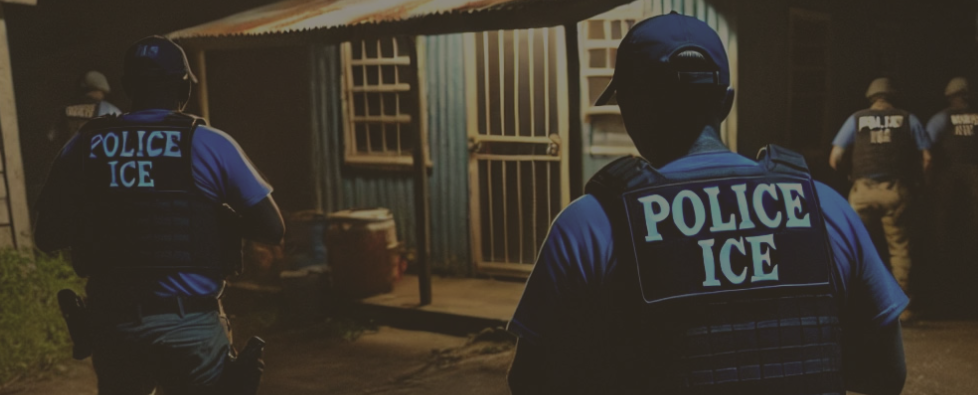
- Details
- By Levi Rickert
The Trump administration’s intensified deportation efforts have created unexpected challenges for Navajo citizens living in urban areas like Phoenix. As the U.S. Immigration and Customs Enforcement (ICE) began widespread raids in major cities across the country following the start of President Donald Trump’s second term, concerns have surfaced about Native Americans being mistaken for undocumented immigrants.
On Friday, Navajo Nation President Buu Nygren addressed these concerns during a broadcast on the tribal radio station KTNN. He reported receiving troubling accounts of Navajo citizens experiencing “negative and sometimes traumatizing encounters” with federal agents targeting undocumented individuals in the Southwest.
President Nygren assured the Navajo Nation that his office is actively engaging with the Department of Homeland Security, ICE, Arizona Governor Katie Hobbs, New Mexico Governor Michelle Lujan Grisham, as well as U.S. Senators, House representatives, and state officials to address the issue.
The Navajo Nation Office of Vital Records has been inundated with calls from tribal members residing off-reservation, many of whom report being questioned by ICE agents about their identity.
Arizona state Senator Theresa Hatathlie (Navajo), who represents Arizona’s sixth senate district, highlighted a specific incident where a Navajo citizen was detained for nine hours. She stressed the urgent need for emergency protocols to protect tribal members.
Navajo Nation Council Speaker Crystalyne Curley echoed the urgency, emphasizing the critical role of the Executive Branch in safeguarding tribal members living off-reservation. “Our people are reaching out to us directly, and their needs are urgent,” Speaker Curley said. “We must act swiftly to ensure their safety and well-being. Our constituents are depending on us for solutions.”
President Nygren advised Navajo citizens to be prepared when approached by ICE officers, emphasizing the importance of being proactive during these encounters.
“We are advising Navajo citizens to carry state-issued identification, such as a driver’s license or other picture identification if available. Having your state ID is crucial, and if you possess a CIB (Certificate of Indian Blood), it can provide an additional layer of reassurance,” President Nygren said.
Hatahlie stressed that many tribal members struggle with documentation, which has worsened under the recent ICE sweeps. Despite possessing Certificates of Indian Blood (CIBs) and state-issued IDs, several individuals have been detained or questioned by ICE agents who do not recognize these documents as valid proof of citizenship.
“Our office remains dedicated to provide accurate information and to assist any and all Navajo citizens who get caught up in immigration issues,” President Nygren said.“If you do run into issues with federal immigration officials, reach out to our office through Operation Rainbow Bridge.”
The Operation Rainbow Bridge telephone number is 855-435-7672.
The 25th Navajo Nation Council encourages Navajo tribal members impacted by ICE raids to contact the Navajo Nation Human Rights Commission Office at 928-871-7436.
More Stories Like This
Chickasaw Lighthorse Police Officer named Indian Country Law Enforcement Officer of the YearIndian Gaming Association Rallies Broad Coalition Against Sports Event Contracts It Calls Illegal Threat to Tribal Sovereignty
Navajo Resources and Development Committee Issues Notice on Livestock Inspection Requirements
American Prairie, Tribal Coalition Files Protest Over Rescinded Grazing Rights
Northern Cheyenne Push Back Against Trump Administration’s Effort to Alter Little Bighorn History
Help us defend tribal sovereignty.
At Native News Online, our mission is rooted in telling the stories that strengthen sovereignty and uplift Indigenous voices — not just at year’s end, but every single day.
Because of your generosity last year, we were able to keep our reporters on the ground in tribal communities, at national gatherings and in the halls of Congress — covering the issues that matter most to Indian Country: sovereignty, culture, education, health and economic opportunity.
That support sustained us through a tough year in 2025. Now, as we look to the year ahead, we need your help right now to ensure warrior journalism remains strong — reporting that defends tribal sovereignty, amplifies Native truth, and holds power accountable.
 The stakes couldn't be higher. Your support keeps Native voices heard, Native stories told and Native sovereignty defended.
The stakes couldn't be higher. Your support keeps Native voices heard, Native stories told and Native sovereignty defended.
Stand with Warrior Journalism today.
Levi Rickert (Potawatomi), Editor & Publisher


